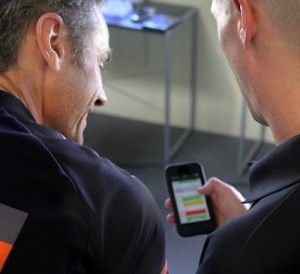 There are many different coaching options out there with different types of coaching, training plans, and race-specific coaching groups. Over the course of my 20+ year coaching career, I’ve tried them all as an athlete and as a coach.
There are many different coaching options out there with different types of coaching, training plans, and race-specific coaching groups. Over the course of my 20+ year coaching career, I’ve tried them all as an athlete and as a coach.
In my experience, I’ve seen that consistency pays off more than anything. This means consistency in hitting your workouts week in and week out, month in and month out, and year in and year out. If you look at the most successful athletes, you’ll hear stories of how they’ve been with the same coach for years and that they’ve gone through the ups and downs of training and racing with that same coach by their side. Even past champs, who thought they had it figured out, leave their current coach only to come back to the old coach to regain their old form.
I often get the question from athletes, “How long do I need to train with a coach to meet my goals?” or “I haven’t been training for a while, but I think I can complete an Ironman in six months. Is six months enough time to train with you?” and so on. It’s amazing to me how athletes don’t take the training seriously for such a long and difficult event. Many people want to complete a long distance event, or even their first triathlon without a coach, and I completely understand that mindset 100%. My focus in this article is on the athlete who really wants to maximize their race time and get the most out of their body on race day by employing help from a professional. So, the question I’d like to answer is, “If I really want to race my best, how long do I need a coach for in order to prepare for my Ironman or half Ironman race?”
It’s a complicated answer, and we’ll get to that in a minute. First of all, let’s take into account all the factors of training:
- Learning how to correctly execute the skills of swimming, biking, running and strength training. For example, how often do you perform swim drills, bike drills, run drills? How much time have you spent with a knowledgeable strength coach who can help you perform all the correct movements in the gym? If you can’t do one rep, one lap, one mile, one pedal stroke perfectly, how can you expect to do it for 140.6 miles, without getting injured? There are many coaches out there that believe you don’t need strength training or skill workouts, and that’s a mistake.
- Getting to know your coach and how your rapport is with him/her. This is a critical part of improving! A coach you don’t like, won’t earn your trust. You’ll be wasting your time performing workouts on a schedule you don’t believe in.
- Learning your own body and how certain workouts affect you. Does your body do better with a long bike, followed by a long run the next day? Or do you do better with separating those workouts by a few days? Any coach or training plan that puts you in a “one size fits all” plan, probably isn’t doing much individual coaching. Don’t expect to hit your own personal goals from a coach that says, “Everyone is on the same plan. If it works for them, it’ll work for you.” Individual athletes have different levels of experience and different goals. A coach and training plan should reflect those individual differences.
“My experience has shown me that the athletes who come on board for six months at a time start to understand things right about the time they are entering their final taper phase.”
It takes time to mesh with your coach and to get all the systems down. The athletes who come on for nine months are much closer to maxing out their abilities and are much more ready to race than athletes who are on board for six months. The athletes who are typically the most dedicated and make the most gains year to year are the athletes who are connected with their coaches year-round. Does this mean you don’t get a break from your coach? Of course you do! Your coach needs a break from you too. But having your coach there to bounce questions off, get an opinion about a new nutrition supplement, strength exercise and so on is invaluable. It’s a team effort and the coach and athlete should be in communication regularly, whether you are in race season or not.
My general rule of thumb for the maximizing of your potential is roughly an 11-month cycle of training. It takes that long to get the system down, to get to know your coach, his/her workouts, how they affect you and what your improvement rate is. If you gave me two athletes who were identical twins, and I was going to coach one for six months and one for 12 months, in a race I would put my money on the one who was working with me for 12 months, every time. There is so much to gain by having a long-term coaching relationship with a qualified coach. Like anything else in life, the longer you do something, the better you are going to get at it!



